We're honouring the remarkable women of the past with brand new records
4-5 minute read
By Jessie Ohara | March 4, 2022
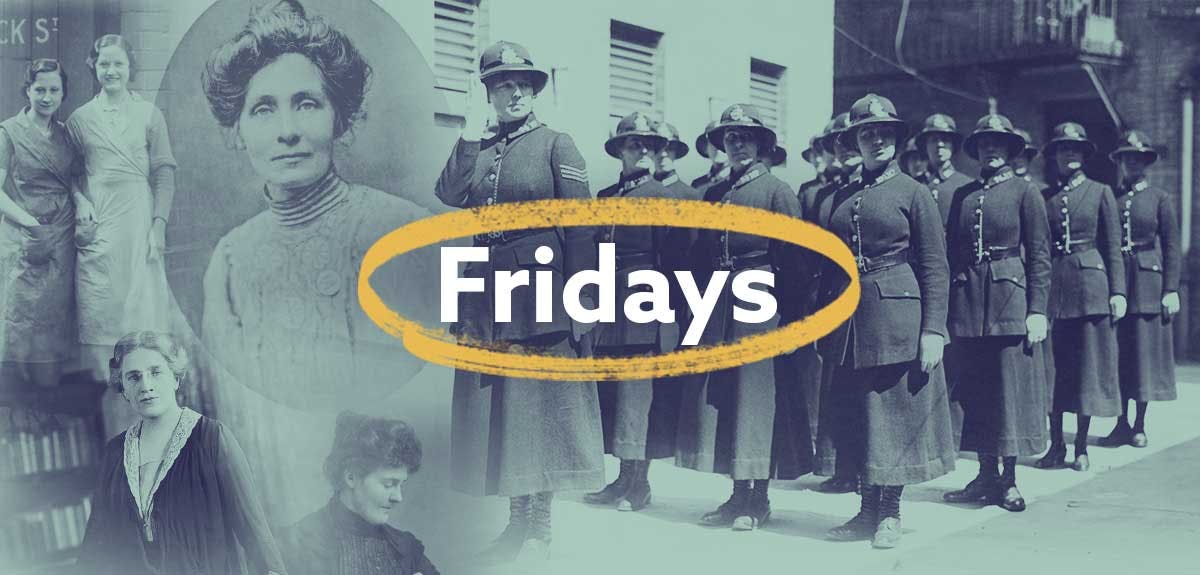
Join us as we discover more of women's history from 1659.
This week, we've released an extra 50,000 Lincolnshire burials, and with International Women's Day around the corner, we're honouring our female ancestors with the Quaker Women's Petition of 1659.
Quaker Women’s Petition, 1659
1659 was somewhat of a tumultuous year for Britain with Richard Cromwell's forced disbandment of the Parliament of England, the re-establishment of the Rump Parliament in May, and the Long Parliament reformation at Westminster later in the year. Quaker and Non-Conformist reactions to this varied from optimism for a more religiously liberal government to the expectation of a much more ruthless one. Being 30 years prior to the 1689 Act of Toleration, Quakers and other Non-Conformists were often shunned, restricted and outcast for their beliefs.
Rumours that the Rump Parliament was going to abolish tithes circulated and in response, the Quakers resolved to go across the country and take names for those that would support the abolishment. Whether or not they took separate petitions for men and women, or whether or not they separated them after the fact, is unknown.
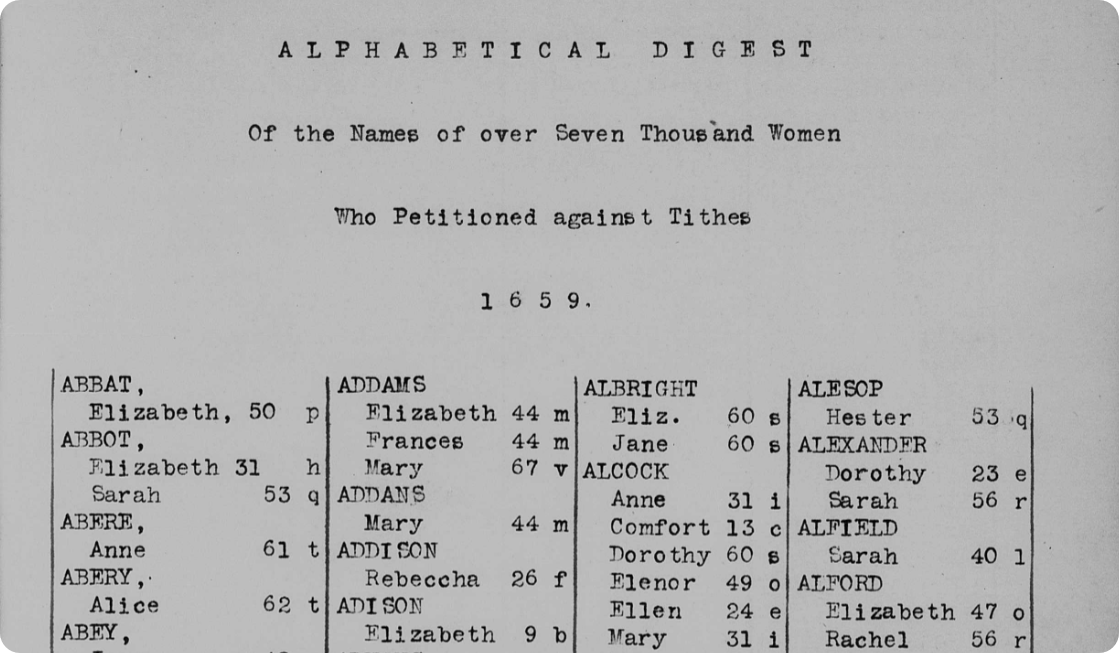
Many of these women were imprisoned for tithe refusal, or for the alleged harassment of ministers prior to the signing of the petition. In one instance, a widowed and poor Quaker named Agnes Barratt was financially unable to pay tithes to the local minister and was consequently arrested. However, it is said that a friendly neighbour of hers named William Mead paid her debt to the bailiffs and had her released. In another more harrowing instance, a woman named Sarah Sergeant was imprisoned by officials at a time that would purposefully interfere with her harvesting efforts, not too long after her husband's own incarceration. When her two servants continued to collect the crop, they too were imprisoned. Shortly after, her husband died in jail (Kent,“Hand-Maids and Daughters of the Lord”: Quaker Women, Quaker Families, and Somerset’s Anti-Tithe Petition in 1659,2008).
Individual stories like the above litter this period of history: Quaker opposition to Church of England tithes often led to their restriction of freedoms, hefty fines, or even cost their lives. Accounts like these demonstrate the divisiveness that state-sanctioned tithes caused across Non-Conformist communities, and the repercussions they faced for opposing them. We must then appreciate and admire the strength and bravery of these women for documenting their names and locations to an authority that was, at its core, against their freedom of worship.
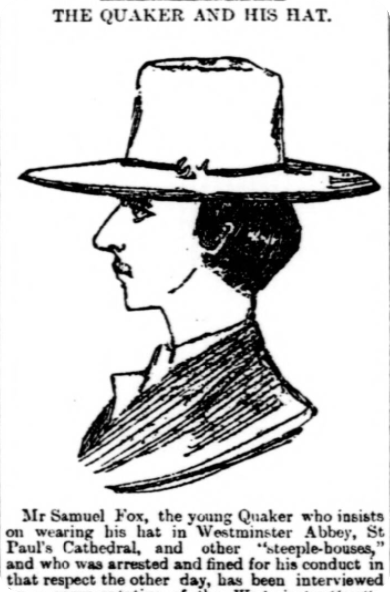
An illustration from Edinburgh Evening News entitled 'A Quaker and his Hat', 1893.
This collection includes the following introduction:
"''These several papers was sent to the Parliament the twentieth day of the fifth Moneth [sic], 1659, being above seven thousand of the names of the Hand-Maids and Daughters of the Lord."
"And such as feels the oppression of Tithes, in the names of many more of the said Handmaids and Daughters of the Lord, who witness against the oppression of Tithes and other things as followeth.''"
It is relatively rare to see a collection of entirely female names, especially from so far back the 17th century. With these records also stating location, this index is an excellent resource for pinning down your female ancestors to an exact location, particularly if you know of their involvement with the Society of Friends. It gives an almost unmatched glimpse into the whereabouts of these distant female relatives, in turn painting a bolder picture of your family tree and the women who inhabit it.
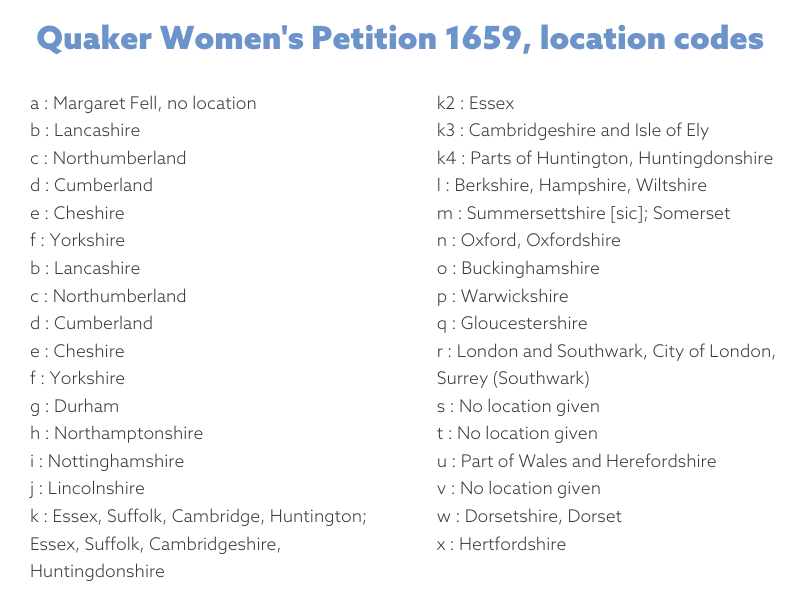
The locations aren't written in full on the original images. Instead, they're assigned letters throughout the index. You can either check the table above, refer back to the extra information on the advanced search page or view the transcription to help you pin down your ancestor.
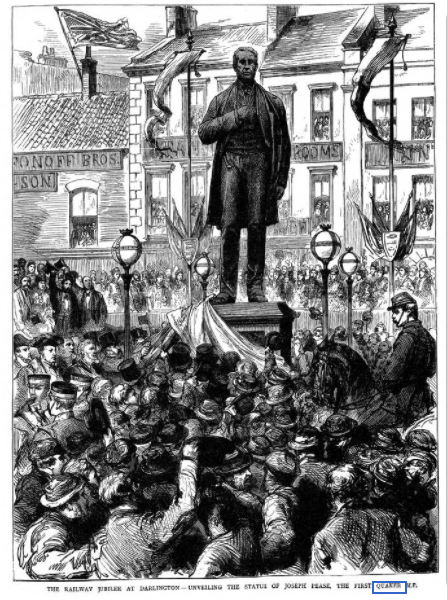
An illustration from the Graphic, entitled 'The Railway Jubilee at Darlington - unveiling the statue of Joseph Pease, the first Quaker MP', 1875.
Interestingly, the 1900s transcription notes suggest that not every name in this collection is of Quaker faith, despite most academics agreeing that the petition was put forward by the Society of Friends. Don't be too hasty to assume that your ancestor was a Quaker if they are found in this index - as always, we recommend comparing sources, England and Wales Society of Friends (Quaker) Births index, or our wider England and Wales Non-Conformist Births and Baptisms.
Lincolnshire Burials
We've added over 50,000 new Lincolnshire burial records this week.
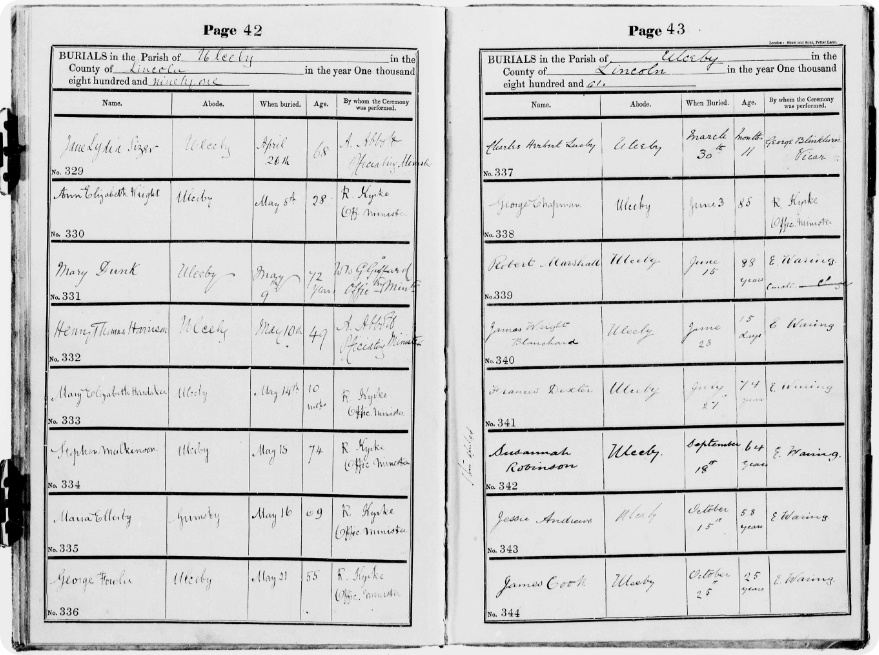
An image of an original burial record from our Lincolnshire collection.
These new additions focus on four cemeteries in Lincolnshire:
- Horncastle Cemetery
- Louth Cemetery
- Bourne Cemetery
- Great Grimsby Cemetery
These records can give you rich biographical detail, such as burial date, burial place and church. Some may also note information such as marital status, place of residence or who performed the burial.
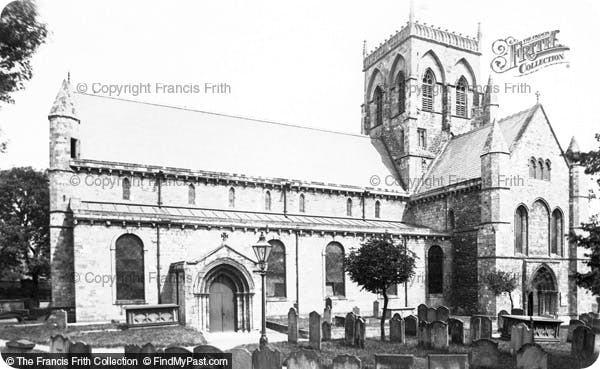
St James' Church, Grimsby, found in the Francis Frith Collection.
As always, make sure to check the original image for extra information.
What's headlining this week?
For the second week in a row, our newspaper additions are vast and extensive. We've released 22 brand new titles and updated 57 of our existing ones. These new additions span all across the country, including four Scottish titles and eight regional papers from England. We've also released The Methodist Times, which represented an evangelical branch of Victorian Methodism and included thought pieces on social morality, class and temperance. Here's a rundown of everything that's new this week.
New titles:
- Abingdon Free Press, 1902-1910, 1912-1916
- Ayrshire Weekly News and Galloway Press, 1879-1889, 1891
- Bedfordshire on Sunday, 1986
- Birmingham News, 1986-1987
- Burton Trader, 1986
- Chatham Standard, 1986
- Greenwich and Deptford Observer, 1879-1909
- Harrow Informer, 1986
- Horley & Gatwick Mirror, 1986
- Hounslow & Chiswick Informer, 1986
- Macclesfield Express, 1988, 1990
- Methodist Times, 1885-1902
- Oban Telegraph and West Highland Chronicle, 1881-1886, 1888-1891
- Scottish Border Record, 1881-1892
- Sevenoaks Focus, 1989
- South Devon Weekly Express, 1909-1913, 1915-1945, 1949-1954
- Stockport Express Advertiser, 1986
- Sutton Coldfield News, 1986
- Uxbridge Leader, 1986
- Weekly Scotsman, 1879-1890
- Welsh Gazette, 1899-1900, 1903-1910, 1912-1951
- Woolwich Herald, 1896-1900, 1902-1904, 1906-1931
Updated titles:
- Acton Gazette, 1987
- Birmingham Daily Gazette, 1894
- Birmingham Mail, 1907
- Bracknell Times, 1973, 1975-1976, 1990
- Buckinghamshire Examiner, 1990
- Burton Daily Mail, 1981, 1987
- Bury Free Press, 1987, 1989
- Cambridge Town Crier, 1986
- Cheddar Valley Gazette, 1990
- Cheshire Observer, 1980, 1989
- Coleshill Chronicle, 1990
- Commercial, Shipping & General Advertiser for West Cornwall, 1867-1869, 1879, 1889-1891, 1894-1896
- Deal, Walmer & Sandwich Mercury, 1872, 1889
- Distillers’, Brewers’, and Spirit Merchants’ Magazine, 1902
- Dover Chronicle, 1875
- Dover Express, 1986
- Ellesmere Port Pioneer, 1988
- Faversham Times and Mercury and North-East Kent Journal, 1986
- Glasgow Property Circular and West of Scotland Weekly Advertiser, 1885
- Grantham Journal, 1989
- Hammersmith & Shepherds Bush Gazette, 1988
- Hants and Sussex News, 1894
- Harrow Observer, 1990
- Hinckley Times, 1988
- Huddersfield Daily Examiner, 1988
- Kilmarnock Standard, 1979, 1981, 1989
- Leek Post & Times and Cheadle News & Times and Moorland Advertiser, 1986
- London and China Express, 1922
- Long Eaton Advertiser, 1986
- Loughborough Echo, 1987, 1990-1991
- Macclesfield Courier and Herald, 1829-1832, 1834-1836
- Merthyr Express, 1911
- Middlesex County Times, 1988, 1990
- Middleton Guardian, 1891
- Midland Mail, 1900-1901
- Nantwich Chronicle, 1961
- Newmarket Journal, 1988-1989
- North Star (Darlington), 1884
- North Wales Weekly News, 1982, 1984, 1988
- Nottingham Evening Post, 1957, 1963-1966, 1972
- Nottingham Recorder, 1986
- Runcorn Weekly News, 1990
- Rutland Times, 1995, 1997-1999
- Somerset Standard, 1962
- Southall Gazette, 1988
- Southport Visiter, 1986
- Staffordshire Newsletter, 1986
- Stamford Mercury, 1986
- Stockport Advertiser and Guardian, 1981
- Suffolk and Essex Free Press, 1928-1940
- Surrey Herald, 1986
- Tamworth Herald, 1986
- Trowbridge Chronicle, 1863, 1865-1868, 1871-1872, 1874-1876, 1878-1880, 1883-1887, 1889, 1893, 1895, 1897-1901, 1903-1905
- Whitstable Times and Herne Bay Herald, 1989
- Winsford Chronicle, 1964
- Wishaw Press, 1985, 1989
- Y Tyst, 1890-1891
Something catch your eye? Just head to our newspaper archive and filter your search results by title or search all of this week's new titles.
If you're looking for extra tips, tutorials or even just a chat, get in on the action and head over to our Facebook on Fridays at 4 pm (UK time) to join our community for our weekly genealogy talk. Who knows what you'll discover?
Related articles recommended for you
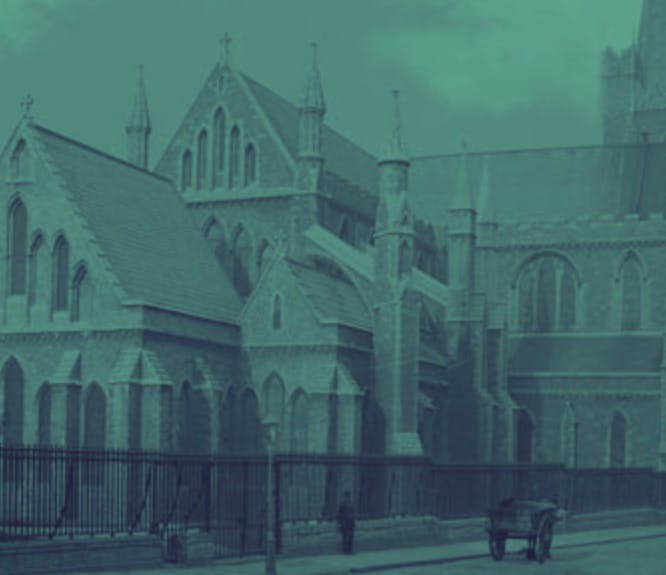
Irish family history and minority religions in Ireland
History Hub
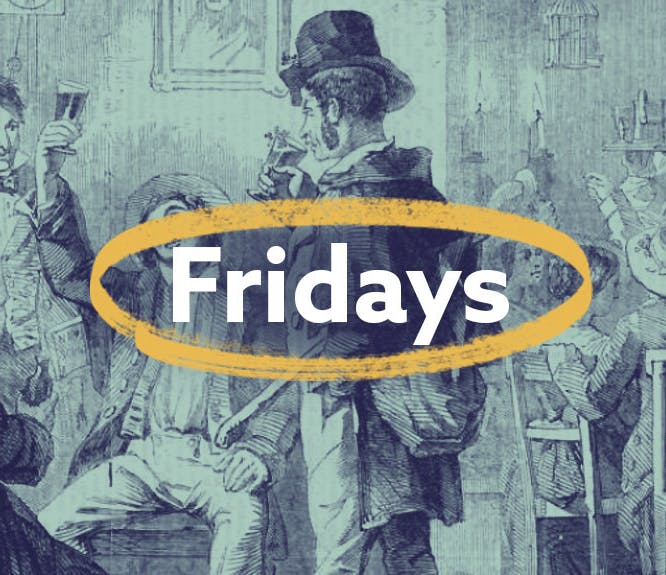
Celebrating Irish stories with almost a million new records
What's New?

Browse Derbyshire baptisms, Boer War records and more
What's New?

